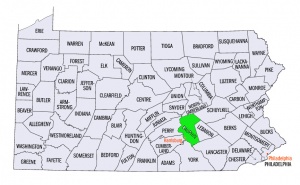Difference between revisions of "Dauphin County (Pennsylvania, USA)"
| [unchecked revision] | [checked revision] |
GameoAdmin (talk | contribs) (CSV import - 20130816) |
GameoAdmin (talk | contribs) (CSV import - 20130820) |
||
| Line 1: | Line 1: | ||
| − | + | [[File:PA-Dauphin.jpg|300px|thumb|right|'''']] When [[Lancaster County (Pennsylvania, USA)|Lancaster County]] was formed in 1729, Peshtank and Derry townships took in most of the present Dauphin County, which was not organized until 4 May 1785. When the Lancaster-Harris Ferry Road was laid out in 1737, many Mennonites moved into this area, among them Andrew Hershey, Felix Landis, Jr., the Nissleys, Reesers, Mummas and Stricklers. The Stauffer congregation existed as early as 1780. In 1954 the congregations in the county were [[Stauffer Mennonite Church (Conewago Township, Pennsylvania, USA)|Stauffer]], [[Shope Mennonite Church (Highspire, Harrisburg, Pennsylvania, USA)|Shope]], Strickler and [[Steelton Mennonite Gospel Mission (Steelton, Pennsylvania, USA)|Steelton]], with a total membership of 278. Noah W. Risser and Clarence E. Lutz were the bishops in charge of these churches at that time. In addition to the local ministry, the rural congregations early were served by ministers traveling to [[Juniata County (Pennsylvania, USA)|Juniata County]] and points west and southwest. | |
| − | |||
| − | |||
{{GAMEO_footer|hp=Vol. 2, p. 17|date=1956|a1_last=Landis|a1_first=Ira D|a2_last=|a2_first=}} | {{GAMEO_footer|hp=Vol. 2, p. 17|date=1956|a1_last=Landis|a1_first=Ira D|a2_last=|a2_first=}} | ||
Revision as of 19:10, 20 August 2013
When Lancaster County was formed in 1729, Peshtank and Derry townships took in most of the present Dauphin County, which was not organized until 4 May 1785. When the Lancaster-Harris Ferry Road was laid out in 1737, many Mennonites moved into this area, among them Andrew Hershey, Felix Landis, Jr., the Nissleys, Reesers, Mummas and Stricklers. The Stauffer congregation existed as early as 1780. In 1954 the congregations in the county were Stauffer, Shope, Strickler and Steelton, with a total membership of 278. Noah W. Risser and Clarence E. Lutz were the bishops in charge of these churches at that time. In addition to the local ministry, the rural congregations early were served by ministers traveling to Juniata County and points west and southwest.
| Author(s) | Ira D Landis |
|---|---|
| Date Published | 1956 |
Cite This Article
MLA style
Landis, Ira D. "Dauphin County (Pennsylvania, USA)." Global Anabaptist Mennonite Encyclopedia Online. 1956. Web. 19 Jan 2026. https://gameo.org/index.php?title=Dauphin_County_(Pennsylvania,_USA)&oldid=80045.
APA style
Landis, Ira D. (1956). Dauphin County (Pennsylvania, USA). Global Anabaptist Mennonite Encyclopedia Online. Retrieved 19 January 2026, from https://gameo.org/index.php?title=Dauphin_County_(Pennsylvania,_USA)&oldid=80045.
Adapted by permission of Herald Press, Harrisonburg, Virginia, from Mennonite Encyclopedia, Vol. 2, p. 17. All rights reserved.
©1996-2026 by the Global Anabaptist Mennonite Encyclopedia Online. All rights reserved.

